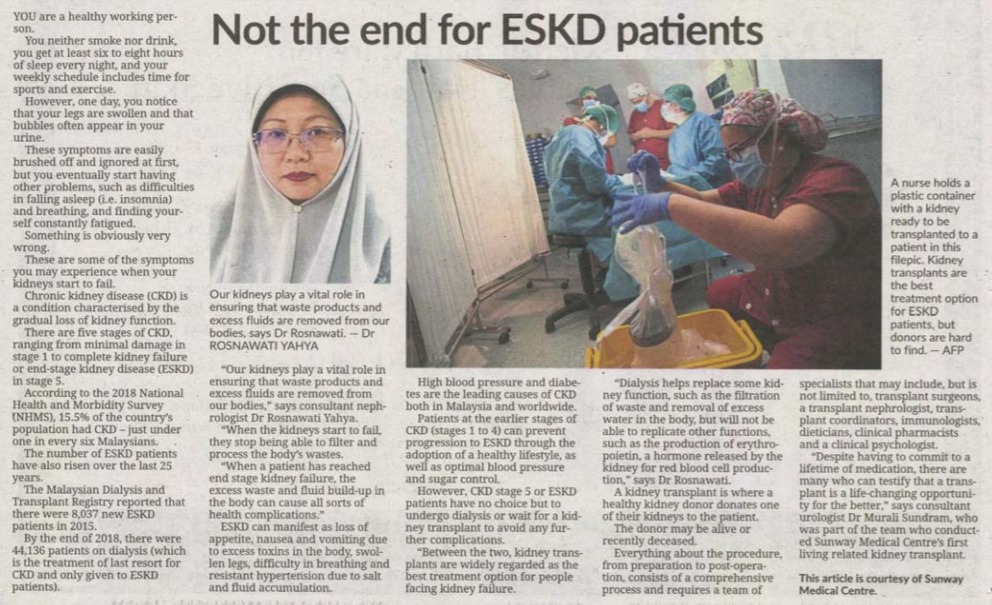Not the end for ESKD patients
25 October 2020

You are a healthy working person. You neither smoke nor drink, you get at least six to eight hours of sleep every night, and your weekly schedule includes time for sports and exercise. However, one day, you notice that your legs are swollen and that bubbles often appear in your urine.
These symptoms are easily brushed off and ignored at first, but you eventually start having other problems, such as difficulties in falling asleep (i.e. insomnia) and breathing, and finding yourself constantly fatigued. Something is obviously very wrong.
These are some of the symptoms you may experience when your kidneys start to fail. Chronic kidney disease (CKD) is a condition characterized by the gradual loss of kidney function.
There are five stages of CKD, ranging from minimal damage in stage 1 to complete kidney failure or end stage kidney disease (ESKD) in stage 5.
According to the 2018 National Health and Morbidity Survey (NHMS), 15.5% of the country’s population had CKD – just under one in every six Malaysians. The number of ESKD patients have also risen over the last 25 years.
The Malaysian Dialysis and Transplant Registry reported that there were 8,037 new ESKD patients in 2015. By the end of 2018, there were 44,136 patients on dialysis (which is the treatment of last resort for CKD and only given to ESKD patients).
“Our kidneys play a vital role in ensuring that waste products and excess fluids are removed from our bodies,” said Sunway Medical Centre Consultant Nephrologist, Dr Rosnawati Yahya.
“When the kidneys start to fail, they stop being able to filter and process the body’s wastes. When a patient has reached end stage kidney failure, the excess waste and fluid build-up in the body can cause all sorts of health complications.”
ESKD can manifest as loss of appetite, nausea and vomiting due to excess toxins in the body, swollen legs, difficulty in breathing and resistant hypertension due to salt and fluid accumulation.
High blood pressure and diabetes are the leading causes of CKD both in Malaysia and worldwide.
Patients at the earlier stages of CKD (stages 1 to 4) can prevent progression to ESKD through the adoption of a healthy lifestyle, as well as optimal blood pressure and sugar control.
However, CKD stage 5 or ESKD patients have no choice but to undergo dialysis or wait for a kidney transplant to avoid any further complications.
“Between the two, kidney transplants are widely regarded as the best treatment option for people facing kidney failure.
“Dialysis helps replace some kidney function, such as the filtration of ware and removal of excess water in the body, but will not be able to replicate other functions, such as the production of erythropoietin, a hormone released by the kidney for red blood cell production,” says Dr Rosnawati.
A kidney transplant is where a healthy kidney donor donates one of their kidneys to the patient. The donor may be alive or recently deceased.
Everything about the procedure, from preparation to post-operation, consists of a comprehensive process and requires a team of specialists that may include, but is not limited to, transplant surgeons, a transplant nephrologist, transplant coordinators, immunologists, dieticians, clinical pharmacist and a clinical psychologist.
“Despite having to commit to a lifetime of medication, there are many who can testify that a transplant is a life-changing opportunity for the better,” says Sunway Medical Centre Consultant Urologist, Dr Murali Sundram, who was part of the team who conducted the hospital’s first living related kidney transplant.
Source: The Star
Back


